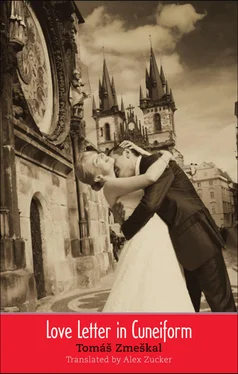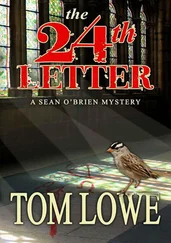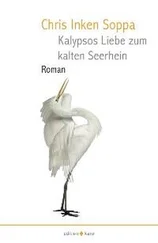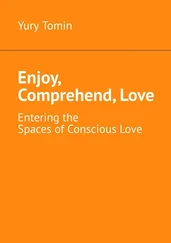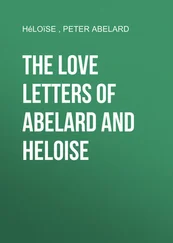“My name is Jesus Socrates Amenhotep Hitler, dear brother,” the pastry chef said.
“All right,” the doctor said, writing down the full name on a sheet of unlined paper where he was taking notes. He was going to need those patient intake forms after all. Looking at his watch and concluding the head nurse might be there by now, he stood, opened the door to the hallway, and called to a passing orderly. “Excuse me, could you bring me some forms from the nurse’s office? Three-one-fives, thanks.”
The policeman, sitting on a bench next to the office, thought to himself, There we go. Now we can get rid of this guy without any scandal.
3. AFTER THE WEDDING — FIRST MEETING WITH FATHER
After the wedding, Maximilian moved in with Alice and her parents. Meanwhile, her father repaired the cottage and they all watched captivated as he sawed beams, hammered nails, and mended the roof with precise, crystal-clear movements, movements that splintered apart into thousands of mirrored fragments, transforming his precision into a blurry silent slow-motion film the moment he climbed down from the roof and put away his tools in the meticulously organized wooden cupboard. As soon as he stopped work on the cottage, his hands began to shake like the leaves on an autumn tree, quivering before they break away from the branch and begin their waltzing descent to earth. The newlyweds had been planning their honeymoon for the end of summer, but in August Russian tanks came rolling into the country, leading them, like so many others, to consider leaving Czechoslovakia for good. It was their first fight. Maximilian wanted to leave, but Alice couldn’t imagine leaving behind the country where she had been born, never to return. No longer being able to see their garden, their flower beds, the proud radishes, tomatoes, and tulips at their cottage? Giving birth to their child in another country? Obviously a child born in Germany, England, or Canada would be German, English, or Canadian, not that that in itself would matter, but she would never be able to fully understand her son or daughter. Added to that was the fact that all the tanks and demonstrations against the invasion left her cold and indifferent. First she discovered that her occasional rheumatic pain had settled down. Then she felt better every day than she had the one before. And finally she discovered that she was expecting. One day, as she was putting jars of preserves away in the kitchen cabinet, she opened one of them, sank her index finger in and scooped out a thick, yellowy, fragrant chunk of apricot. Maximilian, spotting her as he passed through the room, opened the sideboard, took out a teaspoon, and handed it to her. But she just shook her head with Olympian detachment. Little by little Alice began to understand something she had never noticed before. Every beginning, the true beginning of anything with nothing preceding it, is a little like birth, just as every ending is a little death. Feelings like those deserved the rank of cliché, she thought, a distinction of honor earned in combat on the battlefields of the body and mind. Ordinary experience, of the sort nearly everyone has, endlessly repeats until it loses all its uniqueness, and that was exactly what she was feeling. She saw the desire for originality as utterly absurd and alarmingly useless. The only thing that mattered, whether the baby was a boy or a girl, was that it be healthy. Paging through a disreputable oversized magazine with its weekly ration of curiosities from India, the latest advances in technology from the United States, and dispatches on hunters in Siberia savoring the meat of a thousand-year-old frozen woolly mammoth, tucked between a new recipe for mutton and modern fashion trends in Milan, Alice discovered an article on medieval paintings. Two of the illustrations depicted prideful saints and the third, the Virgin Mary at the Annunciation. Printed in color around the Madonna’s head was a halo in a shape that reminded Alice of a bubble. Yes, a bubble, Alice thought. You could even say a bubble of God’s grace. That was what Alice felt: the bubble of pregnancy was also a bubble of God’s grace. The worst thing about it was that she didn’t even feel guilty anymore for not feeling guilty. Their country was occupied, there were tanks in the streets. Her husband wanted to emigrate, her mother and father were sad and timid, and after a few weeks of quick anger they had quickly and timidly grown old. But it made absolutely, positively no difference at all to her, since she was expecting a child.
When Alice looked at the picture with the angel announcing to Mary that she was to be the Mother of God, it was immediately obvious to her that whatever weary, hunched medieval painter had created the image, he must have inquired of his beloved medieval wives, his lovers and the mothers of his children, what God’s grace actually was, and apparently he had been well informed, since how else could someone like him — a mere man — have drawn that rapturous bubble of God’s grace which she herself had felt. Alice knew nothing about the accounts of the medieval mystics; she knew nothing about their ecstasies, about radiant darkness and their mystical inability to distinguish between themselves and God’s glory stretching into the infinite universe. Maximilian noticed the change this expecting had caused in her, and being a mere man he tried merely to understand. Yet Alice didn’t know how to tell him. How to explain the state of pregnancy to someone she loved absolutely and with no reservations, how to explain something to him that he could never experience. She ran up against the barrier of language, the stone chasm suddenly stretching between them from top to bottom. And then, all of a sudden one day, right after waking up, it hit her: “Bliss, Maximilian. Carrying our child is bliss. I think that’s what it was like when people still believed in heaven. Though actually … it’s probably much better!” It was nine months in a bubble of God, and Alice wished it would never end. So when Maximilian handed her a medium-sized teaspoon as her index finger bore a mass of pungent orange-colored apricot jam to her mouth, she just cast an unconcerned look at his astonished face and with indifferent delight let the fragrant matter dissolve first on her tongue, then in her mouth, before letting its sweet taste with a touch of tart soak into her palate and swallowing, or, to be more precise, letting it slide gently and with visible pleasure down her throat. Maximilian stood before her, hand outstretched in a gesture of un-needed assistance. He stood watching his alluring wife, sitting there over her morning coffee not caring one iota what anyone thought of her, what anyone felt, just absolutely content with herself and her life. After swallowing the jam, she licked off her index finger with relish, making a sound with her mouth that could be classified either as satisfaction, pleasure, or a crude, somewhat apathetic smack. Maximilian was suddenly at a loss as to how to interpret the sound, or how it should be interpreted.
“So I guess you don’t want the spoon, huh?” he said when she was done. And in the time it took Alice to raise her eyes, he added, “How come?”
She replied: “I want to savor it with all my senses.” If later Maximilian had thought back on his life with Alice, if he had ever taken the time to consider their relationship, he would have arrived here, at this swallowing of the jam with a piercing smack that he didn’t understand, the moment in which Alice began to be lost to him. Snug inside the opium bubble of sweetness that was her pregnant existence, Alice gradually ceased to be a lover and became permanently and irrevocably a mother. The state of fatherhood certainly couldn’t compare, and that was the reality Maximilian feared. Like Alice, he didn’t hide his feelings much, and when he shared how he felt with his friend Honza, a design engineer of transistor radios and portable reel-to-reel tape players, a Christian, a father of firm morals and four children, his friend told him:
Читать дальше
